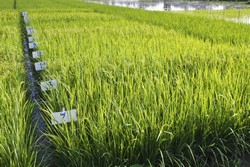Transparent methods for GMO impact assessment
Much controversy surrounds GMOs in Europe, including how GMO food or feed is tested for safety. As different stakeholders push for or against animal testing methods in line with their own interests, European Commission policy intends to reduce, replace and refine animal tests for ethical and animal welfare reasons. This demonstrates the need for evaluation of the added value of animal feeding trials with whole GM food/feed and of alternative test systems. With respect to toxicity testing of GMOs, two sets of 90-day feeding trials and a one year study with GM maize MON810 were carried out since 2013 within the EU-funded project GRACE (GMO risk assessment and communication of evidence) and the results do not prove toxicological relevant effects. Researchers also tested in vitro cell culture systems with respect to their potential to replace feeding trials in the future. In addition, omics approaches analysing plant and animal tissues were investigated as well as composition of the plant material was analysed extendedly. Comparing the different approaches tested to investigate potential toxicological effects caused by GM crops it is concluded that the standard compositional analyses of plants is essentially providing valuable information on presence of critical compounds. In vitro cell cultures and omics on plant and animal tissues might be potential tools for toxicity screenings but need further testing for their value in routine application. The feeding trials with whole GM food/feed failed to gain any useful information for risk assessment. Evaluation of potential impacts of a GMO is often difficult because the pool of evidence is not readily accessible to decision-makers and other stakeholders. GRACE adopted the methodology of evidence synthesis for reviewing studies on the impact of GM crops on health, socio-economy and environment. It supported the comprehensive presentation of evidence on GMO impacts in a transparent and accessible (evaluation) format. A set of protocols for 14 prioritised review questions for evidence maps and systematic reviews were prepared and the respective reviews are currently under elaboration. The database (CADIMA) established by GRACE serves as a hub that provides open access to the primary data generated in this and cooperating projects. It offers tools and formats to perform systematic reviews and evidence maps, and it links with further databases on GMO safety. In essence, GRACE questioned the value of 90-day rat feeding trials with whole GM food/feed. It explored alternative approaches to reduce or substitute animal trials and highlighting their potential value. In parallel, the project elaborated a viable approach to gather and evaluate the quality of existing evidence on the impact of GM plants. A key outcome is that the project uniquely established stakeholder dialogues during both the planning of research and interpretation of its results. The stakeholder dialogue and the services provided through CADIMA can support stakeholders in the field to engage with GMO research and to access and understand its results.
Keywords
GMO, genetically modified organisms, feeding trials, risk assessment, CADIMA



